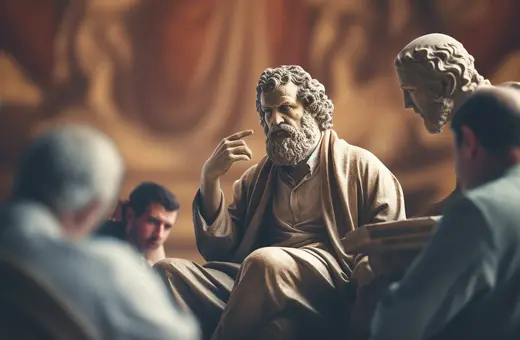On a fine summer day In Hay, at the packed main stage of HowTheLightGetsIn, the world’s biggest philosophy festival, Yuval Noah Harari and Slavoj Žižek appeared together on a panel for the first time. Nature was on the agenda. Is it an existential threat to us, or a source we can continue using freely to improve our lives? It’s not nature we should be worried about, both thinkers agreed. It’s what comes next: a world post-nature. Watch the video debate here.

Yuval Noah Harari and Slavoj Žižek debate the nature of nature. Günes Taylor hosts.
If there is such a thing as celebrity intellectuals, Yuval Noah Harari and Slavoj Žižek fit the bill better than most - even if the latter flinches at being called one. Both thinkers have found popular success beyond the narrow confines of their academic specializations – medieval history for Harari, Hegelian philosophy and Lacanian psychoanalysis for Žižek. The world, it seems, wants to know what they think on all the most pressing issues of our times, from the war in Ukraine to the climate crisis and our posthuman future. Which is what brought them to HowTheLightGetsIn at Hay, the world’s biggest philosophy festival, to debate the question of nature: friend or foe.
The answer is unsurprisingly nuanced: nature is neither our friend nor our enemy. As Zizek and Harari so often claim, everyone is failing to ask the right questions. Because we’re about to enter a post-nature era, and that will change everything.

After a long period of Enlightenment thought that saw nature conquered by reason and tamed by technology, its place in society is back on the agenda in a big way. The COVID pandemic and the climate crisis are both reminders that we have neither fully understood nature, nor taken conclusive ownership and control over it. But being confronted with it once again has meant that people have interpreted nature either as inherently good, in contrast to the morally corrupt humans, or as vengeful, punishing us for our hubris in exploiting the environment. Nonsense, proclaimed Harari and Žižek in agreement. Nature is neither good nor bad – it’s outside of morality. Žižek went further still, and in his usual colourful way, undermined the image of a nurturing nature with the line “If nature is our mother, then she’s a bitch!” As for the vengeance part, the universe is indifferent towards us.
___
___
The agreement, that surprised the speakers (“When will the knives come out?” wondered Žižek) continued when both of them seemed to argue that the distinction between the natural and the non-natural was itself, well, artificial. The idea that all that exists can be understood as part of nature has been around since antiquity but still animates much contemporary philosophy. Despite being a self-proclaimed Hegelian, even Žižek said “I’m not an idealist, I’m a naturalist!” It might not seem such an original thought, but over the past few centuries, our scientific and technological successes had convinced us that humans are somehow above nature, masters of the universe. Even today it sounds strange to our ears to call a nuclear reactor or the COVID vaccine, or the war in Ukraine “natural”. But in some sense, they are. Their existence doesn’t violate any natural law and they are made of the same physical stuff as everything else.



















Join the conversation